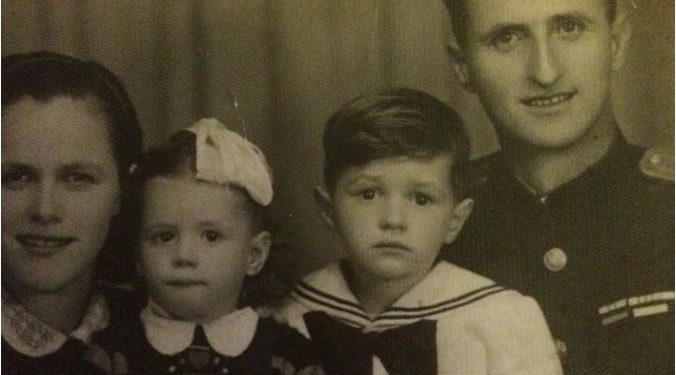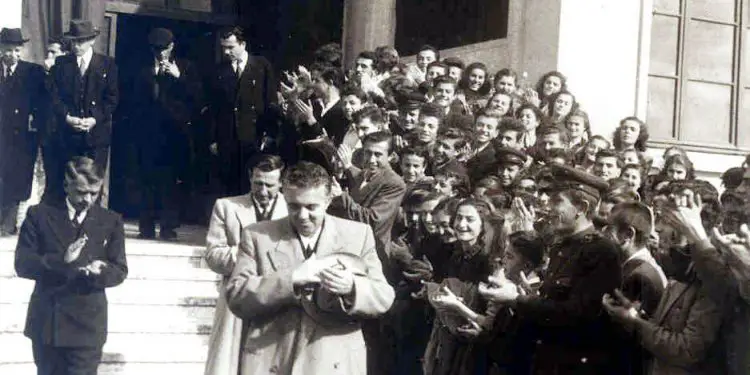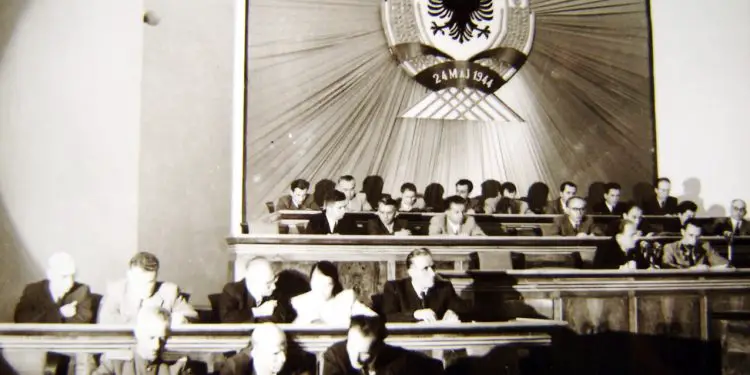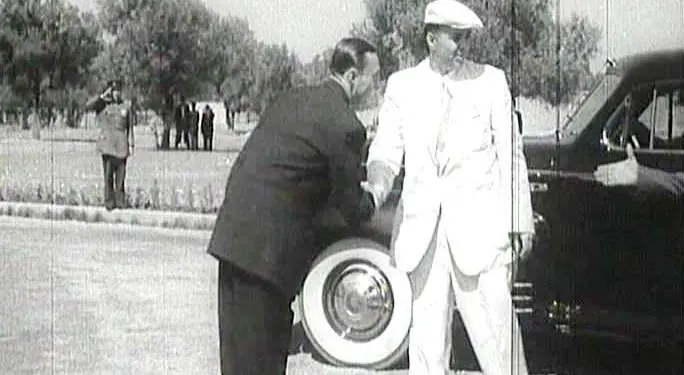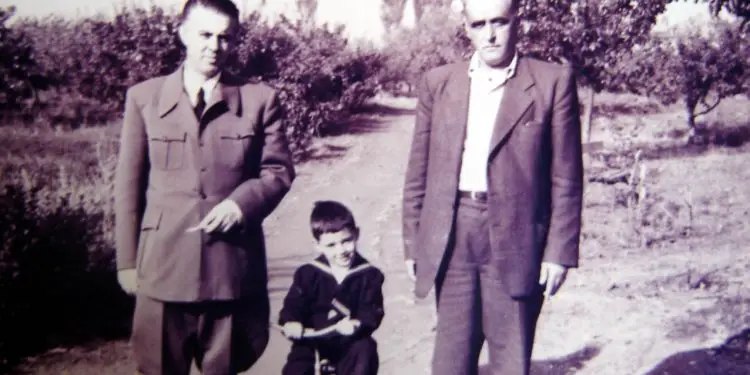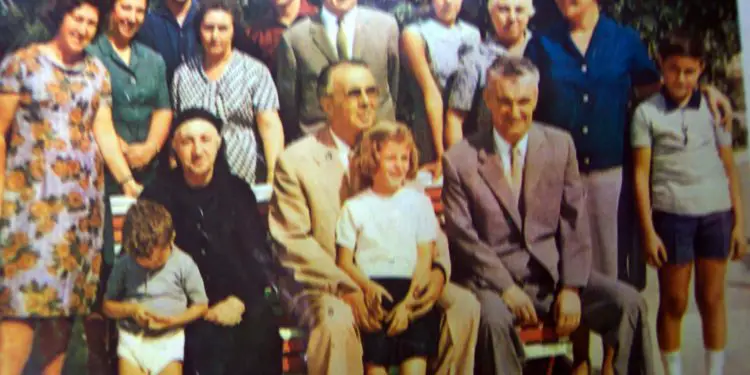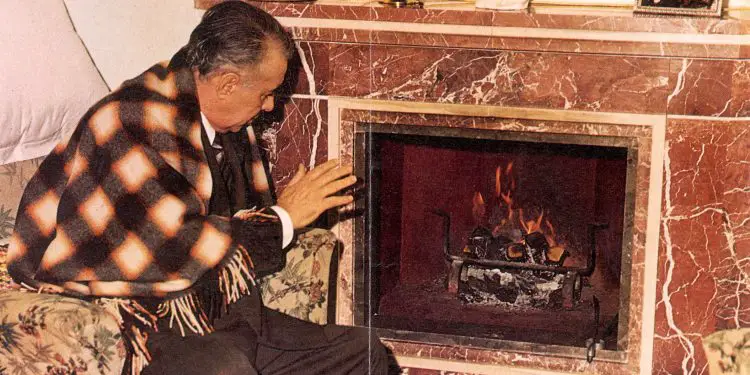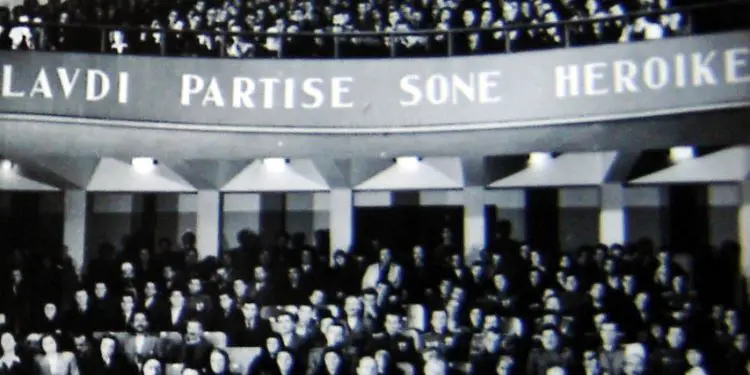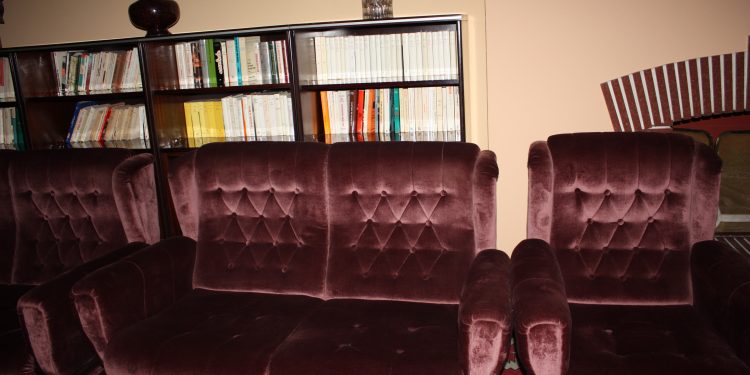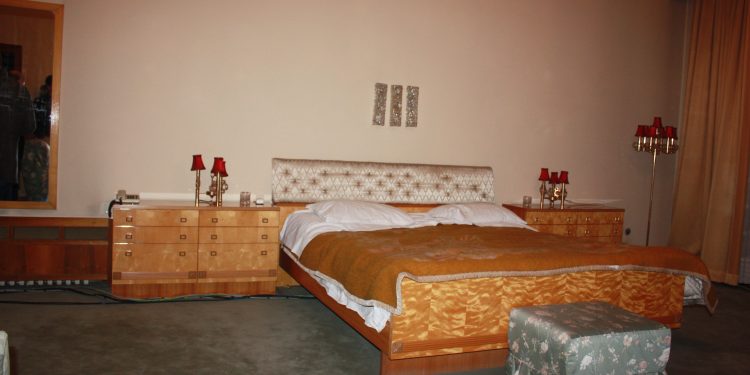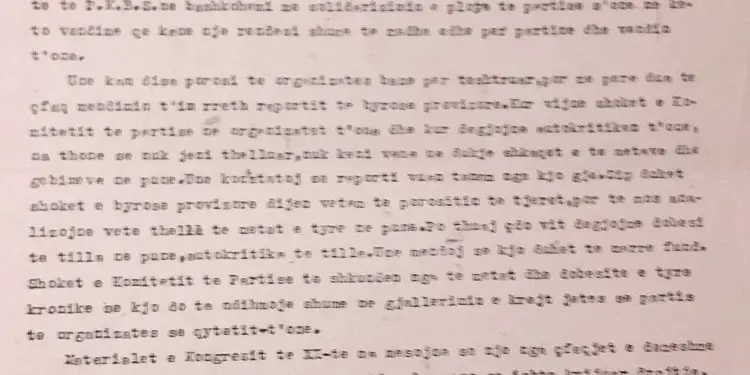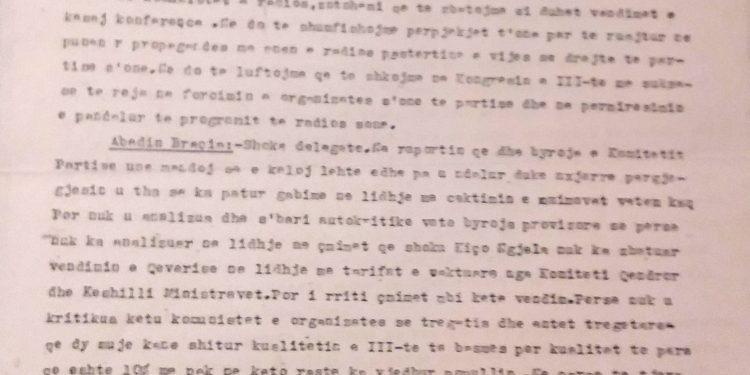Dashnor Kaloçi
Memorie.al publishes the archival document with the discussion of the former journalist of “Zeri i Popullit”, Vehip Demi, originally from Chameria, who in 1956, at the Tirana Party Conference, made harsh accusations against the privileges of senior leadership of the ALP, and personally to Nexhmije Hoxha. Who were the ministers and members of the Politburo who criticized Demi and his mysterious death in the city of Vlora, where he was interned …?
“Friends from above are highly bureaucratized and when it comes to contacts at work, I will bring you our case: Radio Tirana is an important institution for propaganda. By car it is only six minutes from the offices of the Central Committee. But in these six or seven years, my friend Nexhmije, director of Agit-Prop (Propaganda Agitation) has come to us only 2-3 times. Comrade Liri Belishova, since she became secretary for Agit-Prop, has never appeared on Radio. How can you run from the office, how can you run the subordinate sector just by calling the director, without getting in touch with the employees, or at least with the collegium? Another remark: when delegations are sent abroad, there are some names that are often grabbed: Liri Tashko, Vito Kapo, Eleni Terezi, Pilo Peristeri, Fadil Paçrami and some others like our privileged director, Comrade Petro Kita, who now is located in Berlin. This was stated, among other things, at the end of his discussion at the Conference of the Tirana Party Committee in 1956, the chief of the editorial staff of Radio Tirana and the former partisan of the “Çamëria” battalion, Vehip Demi, of who with his speech full of harsh criticism for the wrong political line that the ALP was following and the privileges of its leadership, sparked debates between the delegates and the presidium of that conference. As a result of that attitude, a few days later, Vehip Demi was dismissed from all the functions he held and was declared an anti-party person, appearing ninth in the long list of 21 people that was approved and signed by Enver Hoxha. After that, he was first taken into exile in the Skrapar district and then to Vlora, where he died in mysterious circumstances in 1960, shortly after the arrests of the so-called “Teme Sejko Cham group” began. The circumstances of Vehip Demi’s death were highly suspicious, but his relatives, who remained in exile until 1991, testify that he was poisoned by the State Security, which also took care to hide the traces of his murder.
Debate with the delegate of the Politburo
What did delegate Vehip Demi say in his discussion at the Party Committee Conference for Tirana, which took place in March 1956, just shortly after the XX Congress of the Communist Party of the Soviet Union, where Nikita Khrushchev, among others , criticized all the mistakes of the past, hitting hard on the cult of Stalin ?! What was Demi’s position on the political line followed by the senior leadership of the ALP and on the great gap it had created with the people and the ordinary communists? As can be seen from his discussion, which is located in the State Archive, Vehip Demi was among the first delegates to speak, criticizing the gloomy atmosphere that reigned in the hall where the Party Conference for Tirana took place, after the intervention of the delegate. of the Politburo, who described the questions asked by the delegates of Kinostudios with a spirit of distrust and suspicion towards the leadership of the ALP. Regarding this, at the beginning of his speech, Vehip Demi said: “I, before discussing, was measured several times, I even almost wanted to delete the name I had given to the secretary. Why did I hesitate like that? I hesitated because the word said by the delegate comrade made me think that the questions of Kinostudios comrades are permeated by a spirit of distrust and doubt in the leadership of the Party. Perhaps, I may not have interpreted Comrade Beqir’s answers correctly, but I want to say honestly that they had an effect of shyness on me to discuss freely. We are communists, Comrade Beqir, and here is a Party meeting, which is a school for us. It is better to be encouraged and to say things freely here, even with mistakes, than to suppress them in ourselves, to hold reservations towards the Party and what is worse, to whisper them to each other outside Party meetings. I think personal example from above, encouragement from above, greatly influences to create the right atmosphere for free discussion. When I speak of free discussion, I also mean the second article of “Pravda”, so as not to go to such extremes that, under the guise of open criticism, the straight line of the Party is attacked. Your speech, comrade Beqir, led Zihni Sako to describe the attitude of Kinostudio’s comrades as the attitude of Yaroshenko. This is an extreme thought. I personally agree that it was not fair to formulate many questions of Kinostudio and some of them are wrong, but to criticize these mistakes of friends without restricting in any way their right to free and open discussion. I will lay down below the issues that the party organization has commissioned me to do. Let the Central Committee hear what I am going to say at our Party conference. “From the masses to the masses,” says a high Leninist principle.
Taurus: “Here are the privileges of the Bloc”
Following his discussion, delegate Vehip Demi also focused on the many privileges that the senior leadership of the ALP had sanctioned and the great gap that existed between it and the common people. In this regard, in his speech, Demi said: “We, as journalists, have closely observed the economic difficulties of employees who have come from a land of measures, such as the partial removal of tricks, new categorization, setting new norms, social security law. We consider these measures fair and dictated by our real conditions. But, at the same time, we think these should not have been taken all at once. At the same time, the salaries of middle and senior officials were increased. On the radio we have such a phenomenon: those who received from 5200 lekë higher, all have additional salaries. Couriers, cleaners, goalkeepers have no extras. This means that in our country the disparity between those who receive high salaries and those who receive low salaries has increased. The XX Congress of the KP of the Soviet Union raised the issue of raising low wages. In our case, in the corrections that were made, the opposite happened. While there was criticism of the disparity between high and low salaries, in our country this disparity was further increased. We, as communists, want to express our opinion freely, so that the party and the government can see this. Comrade Beqir insisted that the issue of block supply was decided by the Central Committee. We think that in this case the principle “everyone according to work” is flagrantly violated. Let us argue this. Let’s take an example: a working family with 7000 ALL per month and consisting of 7 people and a functional family with 14000 ALL per month, of the same number of people. The worker can buy guaranteed food items with a value of 750 ALL, while the official buys items with a block value of 7500 ALL. So, the ratio is one in ten. We think that the right criterion would be this: if the worker with a salary of 7000 lek gets 600 gr of sugar per month, the double wage functioner should also get a double amount of guaranteed sugar, i.e. 1200 gr. If he wants more sugar, let him buy it in the market with 230 lek kg, as all the people buy it, because he gets a higher salary for this job. Two women work in the same office: they are both clerks, they give both equally to the society. But society does not give them the same: one has guaranteed food only 200 lekë, and the other 1000 lekë, because one is a working woman and the other a functionary woman. Can such a criterion stand? No, he cannot stand. If the minister gives more to the society and the society rewards him rightly, how can the privilege given to the wife of this minister be justified, by giving her food in the “Block”? Does such a condition arouse parasitism in some people? Yes, I bring an example. Comrade Shuaip Panariti studies abroad and his wife, “who does not work at all”, receives block meals. So, give nothing to society and take a lot from it. We have in our organization our friend Violeta Papuli, an old communist and partisan of the Nac-l War. Her husband, Çoti, has been the editor-in-chief of “Bashkimi”, a country in which another has now been appointed. Çoti studies in Moscow. Violeta now has the block. She says: “I am ashamed of the women of the cooperative to take the food in blocks, because I feel, as a communist, that it becomes a favor to me. Another example: Medar Shtylla’s wife would one day get lamb. The meat part also had a little liver. She says to the seller: “Do not give me liver, for we do not eat it and I do not have a cat to throw it.” We do not have enough liver to feed the people and she complains that there is no cat to throw it. We want to ask the Minister of Trade, Kiço Ngjela, and the Minister of Finance, Abdy Këllezi, where the funds needed to cover the expenses of the “Bloc” come from. In which budget chapter do they enter? We have to admit that the masses below talk a lot about the “Bloc” issue. We cannot hide this. We as communists do not know how to explain them, because we ourselves do not see the existence of the “Bloc” as right. Another thing: we think that the prices of industrial goods are too high. We have heard that comrade Kiço Ngjela went to a clothing store and told the sellers that there are no turnovers, because you do not know how to do cultured trade “.
“Nexhmija has forgotten us”
After harsh criticism regarding the privileges of the senior leadership of the ALP living in the neighborhood of “Block”, in his discussion, the delegate Vehip Demi stopped at the huge gap that she had created with the people and ordinary communists. In this regard, in his speech he said: “Another issue: we join the opinion expressed here that the contacts and ties of leaders with the masses should be strengthened. It happens that close comrades-in-arms from war or illegality work away from each other for no reason: one is a minister and the other a lower-ranking employee. He does not see the minister anywhere: he leaves the house by car and goes to the office, he walks with his family on Sundays by car, or he goes and stays constantly at the party house and does not meet friends anywhere. During the war, did we think we would allow ourselves such a breakup? Never! Friends from above are overly bureaucratic even when it comes to contacts at work. I will bring you our case: Radio Tirana is an important institution for our propaganda. By car it is only six minutes from the offices of the Central Committee. But in these six, seven years, my friend Nexhmije, director of Agit-Prop (Propaganda Agitation), has come to us only 2-3 times. Comrade Liri Belishova, since she became secretary for Agit-Prop, has never appeared on Radio. How can you run from the office, how can you run the subordinate sector just by calling the director, without getting in touch with the employees or at least with the collegium? Another remark: when delegations are sent abroad, there are some names that are often grabbed… Liri Tashko, Vito Kapo, Eleni Terezi, Pilo Peristeri, Fadil Paçrami and some others like our privileged director, comrade Petro Kita, who now is located in Berlin. Is there an opinion that one does this job and the other cannot? Before I conclude, one last question: We are going through a period when the sister parties are drawing the right lessons from the spirit of the XX Congress of the Soviet Union. Inevitably, the question arises yesterday here in this hall: do we have as a party and as a state to learn the lessons of the case?”
After the attack on “Teme Sejko Group”, over 350 Chams were arrested and convicted
As if the unprecedented genocide that the Cham Albanian population had removed in Greece from the forces of General Napolon Zerva had not been enough, after 1960 the same thing was repeated against it. Even, with even more terrible proportions, but with the difference that this time she was suffering not from the Greeks, but from the brothers of one blood. By the early 1960s, when Enver Hoxha was heading for a final cooling-off with Khrushchev and official Moscow, the Soviets used a bluff in order to maintain the Pasha-Liman military base. Soviet advisers to the Interior Ministry convinced Minister Kadri Hazbiu that the Greek government, in cooperation with the Anglo-Americans, was preparing to plot to overthrow the communist regime in Albania. And to carry out this conspiracy, they had relied on a large group of cadres originating from Chameria, who held high positions in the army, the party and the state administration. According to the Soviets, the leader of this conspiracy was the Rear Admiral of the Albanian Navy, Lieutenant General Teme Sejko, and the Chairman of the Executive Committee of Elbasan, Tahir Demi. In this context, the crackdown on the “Cham Group” began and the first to suffer was Major General Hilmi Seiti, chairman of the Shkodra Branch of the Interior, who was poisoned by the Security and died in the offices of the Party Committee in Shkodra. in May 1960. General Seiti was reportedly asked by the Security to, in the interests of the party, admit that he was “the leader of the Cham conspirators”, as it was necessary to expose the Greek monarcho-fascists and the American imperialists. After Seiti did not admit it, he was poisoned and the State Security plan continued with the arrest of Teme Sejko, who was asked to do the same as Seiti. Along with Teme Sejko, were also arrested: his brother, Taho Sejko, Tahir Demi, Sami Murati, Lieutenant Colonel Namik Resuli, Hajri Mane, Ali Xhelo, Adem Osmani, Jonuz Purizio, Nasho Gërxho, etc. Teme Sejko initially did not accept the Security Plan, but after much torture (with the intervention of Mehmet Shehu, who went to prison and was released on bail), he was forced to accept, as he was promised that, after the trial, he would be sent family outside Albania. But his brother, Taho, refused and fell head over heels, losing his memory. While Taho ended up as a laboratory caviar where the students were studying, his brother, Teme Sejko, and the so-called “Cham Group” went on trial and then some of them were executed. After that, an unprecedented genocide began against the Chams in Albania, where more than 350 people were arrested and sentenced to long prison terms. In the Plenum of 1982, when Enver was hitting Kadri Hazbi, he addressed him with these words: “In 1960, you and Mehmet Shehu invented the Cham conspiracy, so that we would not remove the Soviet base from Pasha-Limani”.
After the Tirana Conference, he was interned in Skrapar and Vlora
Vehip Demi, the first Cham cadre to be eliminated by the Security in 1960
Vehip Demi was born in 1913, in Filat of Chameria, where his family originates from, one of the most famous in the whole province. In 1914, when the Greek partisans started the genocide against the Albanian Muslim population of Chameria, like many other families, his family left the lands of their ancestors and settled in Konispol. During the Nazi-fascist occupation of Albania (1939-1944), Vehipi engaged in the anti-fascist movement since 1942, and together with Rexho Plaku, Haki Rushiti, Teme and Taho Sejko formed the first partisan detachment of that province, which they named “Camera”. At the end of the war, Vehipi together with Dervish Dojaka were appointed head of the Anti-Fascist Council of Chameria. After 1945, Vehipi served in various positions and from the beginning of the ’50s he worked as an economic sector journalist in the newspaper “Zeri i Popullit”, which was run by his close friend, Taho Sejko. As an idealistic communist, he could not stand the injustices done to the common people and the privileges created by the senior leadership of the ALP and the Politburo. He raised these issues at the Tirana Party Conference in 1956 and as a result, a few days later he was announced in the list of 21 anti-party persons, which Enver Hoxha’s secretary, Haxhi Kroi, sent to Rita Markos to pursue further… After that, he was interned as a simple worker in the villages of Skrapar and then in the city of Vlora, where he died in very suspicious circumstances, in 1960. According to the testimonies of his relatives, he was poisoned by the State Security in hospital of Vlora, exactly when the attack on the so-called “Group of Cham conspirators” began /Memorie.al




